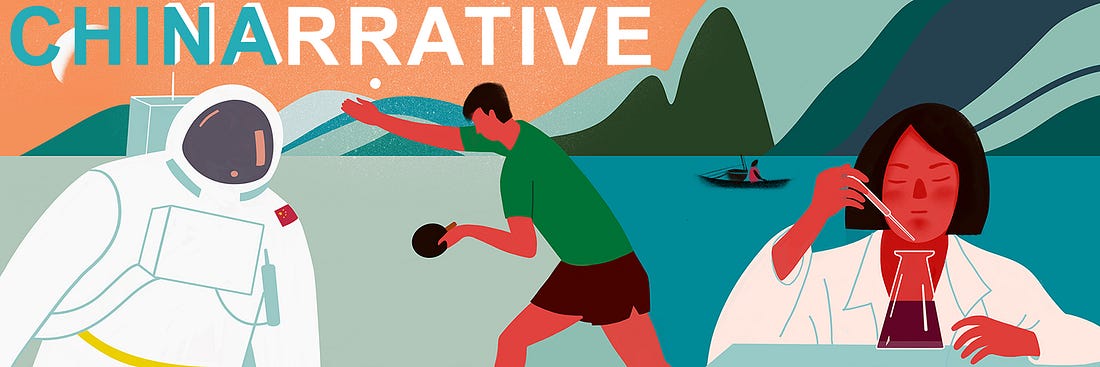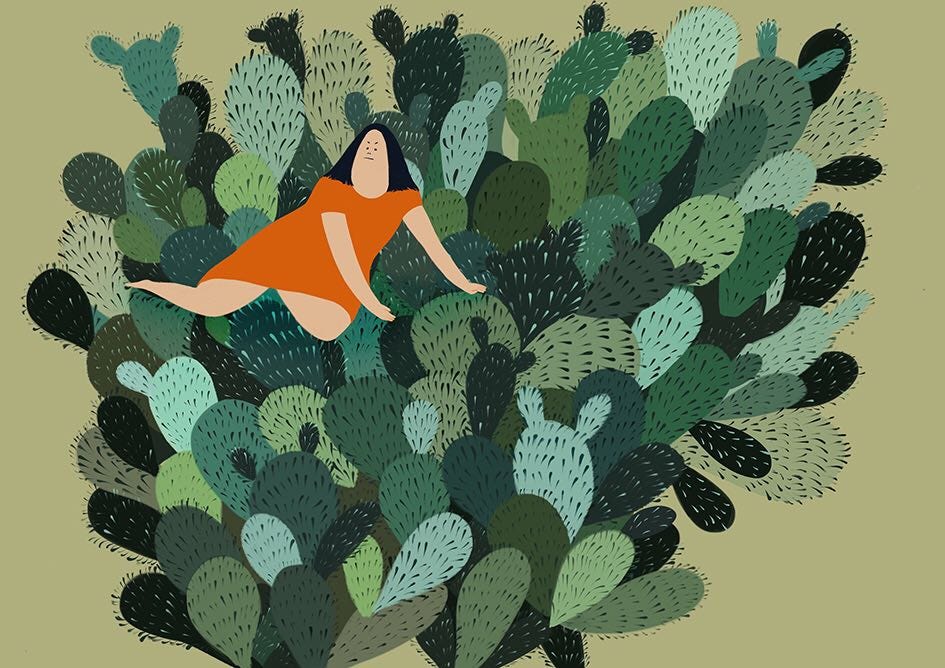
Welcome to the second issue of the Chinarrative newsletter, featuring several exciting developments: news of a collaboration, a selection of must-read stories, and a sneak peek at an upcoming Chinarrative original story.
First, we’re thrilled to announce cooperation with China30s.com, a Shanghai-based writing platform that showcases stories by Chinese people who are largely in their 30s that was founded by former journalist Li Zixin. Features on China30s are typically written in Chinese by nonprofessional writers. According to Li:
There’s no shortage of stories in China—they exist within its people. China30s digs out these tales by encouraging people to share their narratives through writing.
Li is looking also for ways to bring these stories from China to audiences abroad through translation. He believes that personal essays that reflect aspects of life in today’s China will help people overseas gain a wider window on the country.
 Li Zixin, founder of China30s. Colum Murphy for Chinarrative.
Li Zixin, founder of China30s. Colum Murphy for Chinarrative.
To kick off our collaboration, we’re publishing a translated excerpt from “Why Having a Baby Is a Nightmare for China’s Post-90s Couples,” by Wan Qian, which first appeared late last year in Chinese.
Wan, who was born in 1994 and graduated from the Shanghai University of International Business and Economics, did a stint in advertising before quitting to pursue writing. She became the first writer to join Li’s team in 2016. Wan writes about the transforming landscape of contemporary China and the accompanying mindset shift among the country’s younger generations.
In the story featured here, Wan examines attitudes toward childbirth among those born after 1990. Among her subjects is Jiang Jie, a young woman in southern China’s Guangxi province who suffered from postpartum depression. Jiang’s experience offers a rare glimpse into the coping mechanisms of a young Chinese mom, which, in her case, involved stockpiling face masks in her refrigerator instead of food in a desperate bid to hang on to her looks. For more, read on to the end of this newsletter!
Recent stories we liked:
In addition to this issue’s featured excerpt, we would also like to highlight the following outstanding Chinese-language stories:
Wang Fengya Incident In this harrowing story, we learn about Wang Fengya, a child with cancer from a poverty-stricken family in Henan province. The story, which first appeared earlier this month in Freezing Point (Bingdian Zhoukan), tells how Fengya’s increasingly desperate family turns—with mixed results—to crowdfunding and livestreaming to help with mounting medical bills. It also shows how societal expectations serve to only add to the pressures. The girl’s grandfather, for example, opts to use his remaining savings for his son’s marriage rather than spend them on treatment for the sick child. Fengya died on May 4.
Circus Hanging By a Thread Writing for Freezing Point on May 24, journalist Zhang Miao takes us backstage to China’s continually unfolding drama of the circus. Telling the story of the ringleader, Li Rongqing, who is attempting to rebuild his circus career after serving time for the illegal transportation of endangered species, the writer paints a nuanced picture of the many players and factors involved in the country’s complex relationship with animal performances. Supporters see the circus—if it’s run responsibly—as a form of wildlife conservation. Meanwhile, activists such as Hu Chunmei, who also features prominently in the story, argue that animals only suffer in the circus. This article is a pensive read, adding personality and humanity to a contentious topic that is so often sensationalized.
Post-Disaster Psychotherapist As a member of China’s very first “post-disaster psychological crisis intervention team,” Ma Hong has provided support to those affected by incidents such as the tragic fire of Karamay in 1994, the 2002 China Northern Airlines crash, SARS, and the Tianjin explosion of 2015. In a captivating profile written by Ba Rui and published on Renwu on May 23, Ma, 61, speaks of how her faith in humanity strengthened with every assignment. “Humans are capable of walking out of a disaster and finding their way back to ordinary life,” she says.
And from the not-so-distant past:
A Parched Village, a Water Cellar, and Nine Lost Lives This longread is about a tragedy that occurred when a quest for water in an arid part of southern China went horribly wrong. In just a few hours, nine men lost their lives. The story is notable also because through snapshots of the men’s lives, we glean telling details about life in rural China. Writing in Freezing Point, author Cheng Mengchao first lays the scene in Huangtai, a village in Guangxi province:
The land here is nine parts rock, one part earth. Karst towers rise higher than any crop. Flowing water is a rare sight; any rainfall runs quickly away along the rocks. Not surprising then that in this village “all things revolve around water,” so much so that the most coveted asset there is a shuijiao, a traditional kind of water cellar.
Any man without a shujiao would struggle to find a wife, the story cites one 80-year-old villager as saying. The tale unfolds:
Villagers Ling Zehuan and his brother Ling Zemin were looking forward to a new life. The pair used to live in an earthen home; after seven years, Zemin’s wife, fed up with their living situation, left him and their 5-year-old child. Zehuan’s girlfriend, upon seeing the house, also threw in the towel.
All was not lost:
With a loan and a 20,000-yuan (just over $3,100) grant from local government to help them move out of their dilapidated digs, the brothers decided to build themselves a new home in Huangtai, replete with its own water cellar.
Then tragedy struck:
At 8 a.m. on June 12, Zemin entered the home’s recently finished water cellar. A month’s worth of rainfall had seeped inside. Old bits of discarded wood lay soaked in the water, and were covered in a layer of grey-white fungus. Two minutes later, Zemin fell into the water, and silence overcame the tank.
Zemin’s uncle came and managed to pull his nephew’s body out of the water. But shortly after, the uncle collapsed. And so began a series of deaths, where villagers rushed in without forethought, only to perish at the hands of an invisible danger.
The fifth victim was 50-year-old Ling Fubin, who had returned to village after 10 years working in Guangdong province to be nearer to his ageing parents … On the day of the incident, he had just finished feeding his pigs when he heard cries for help. After running down the mountain, he arrived at the Ling brothers’ water cellar, peered inside, and saw the motionless pile of four men at the bottom. Without hesitation, he entered and soon collapsed.
Observers outside the cellar speculated that faulty electrics were to blame for so many deaths. As they tried to figure how to cut the supply, more men lost their lives, including a youngster by the name of Liang Yuanxue, and a delivery man called Huang Zhongbao. When Huang’s cousin arrived, he was so distressed that nothing or no one could stop him from entering the cellar in a bid to rescue his relative and his childhood friend, first victim Ling Zemin.
Those standing by the cellar pleaded with him not to enter, but he was adamant: “They’re all inside,” he said. “Let me through!”
The final fatality was Ling Fugao, the younger brother of one of the earlier victims. Only then did people begin to consider that the water cellar might have contained toxic fumes. The villagers hacked an opening to allow for ventilation. Later, they performed a test to see if the air was pure.
At 9.10 a.m., just over an hour after Zemin crawled into the tank, they threw a chicken in to test the air inside. The chicken lived, and so four villagers jumped into the tank to begin pulling people out.
Results of an investigation into the incident later showed that festering water had reacted with decaying wood for more than one month, producing lethal methane gas.
Three months later, a reporter interviewed an elderly resident of Huangtai, who muttered to himself:
Were our ancestors stupid? It’s plain to see this land has no water. Why would they choose to build a village here?
What’s ahead for Chinarrative:
We’re excited to introduce Lux Chen, a New York-based writer originally from Tianjin in northern China. Look out for her first-person story about how, after falling victim to a housing scam, she finally discovered her Big Apple tribe.
If you liked this newsletter, please help us grow by sharing with friends, family or colleagues.
Until next time!
Colum at Chinarrative
Jiang Jie’s story:
If she hadn’t watched that talk show, Jiang Jie would never have known she had postpartum depression. In the segment, a celebrity called He Jie spoke about the mood disorder. It suddenly dawned on Jiang that she had it.
In the first few months after giving birth to her first baby, Jiang stayed with the child night and day. But somehow, she felt sad. “I lost my sense of self-worth,” she recalls. She also struggled with self-doubt, asking herself: “How could I possibly feed and care for the child every day?”
 Charlotte Fu for Chinarrative.
Charlotte Fu for Chinarrative.
Born in the mid-1990s, Jiang grew up in Laibin, in the southern province of Guangxi. When she was in junior high school, Jiang’s parents left her in the city when they set off for to find work in neighboring Guangdong province. She quickly got used to living alone and became fiercely independent, Jiang told writer Wan.
Before she got married, Jiang had only met her mother-in-law twice. Later, after Jiang became pregnant, her husband’s mother moved in to help Jiang with the baby girl.
The two women quarreled frequently over how best to take care of the baby. Her mother-in-law would insist on putting layers of clothes on the child to prevent it from catching a cold. Jiang hated the thought of her daughter dressing dowdily. Her mother-in-law would constantly want to give food to the baby. Jiang argued the child shouldn’t be forced to eat.
Jiang, who now has two children, is also deeply disturbed by the changes to her body since becoming a mother.
She tells Wan:
Like some old grandma, my breasts have sagged to my navel especially after the baby is weaned. Once balloon-like breasts are now flat—they’re no longer full, and the liquid inside jiggles all the time.
According to Wan, moms from the post-90s generation in China are almost obsessed with posting selfies on social media that emphasize how they’ve maintained their looks after giving birth.
“When the selfie prevails, keeping one’s figure post pregnancy increases anxiety several times over,” she writes.
In addition to changes to her figure, Jiang’s skin altered after becoming pregnant. Previously, Jiang had never had pimples. But after she became pregnant, the pores on her face have become larger with lots of red dots.
Now Jiang has developed the ritual of putting on a face mask, even as often as twice or three times a day. Sometimes, Jiang plays with her children, a mask covering her face.
In the place of food, her refrigerator is full of unopened face-mask boxes. Jiang thinks she has sacrificed a lot for her children, including her figure, time with friends, and career opportunities. Taking good care of her skin is her last holdout, she says.
Jiang has had trouble finding a job after giving birth to her second baby. She worries that when her daughter grows up she will consider her mother worthless for being unemployed.
A friend invited Jiang to work in real-estate sales. Her husband is against the idea and worries she would need to travel on business constantly, and that could mean Jiang wouldn’t be able to take care of the children. If the children got sick nobody would know what to do, he told her.
Jiang disagrees. She says that even though a modest salary won’t help her family much, still she enjoys earning money, telling Wan: “[I like] the feeling of being needed.”


